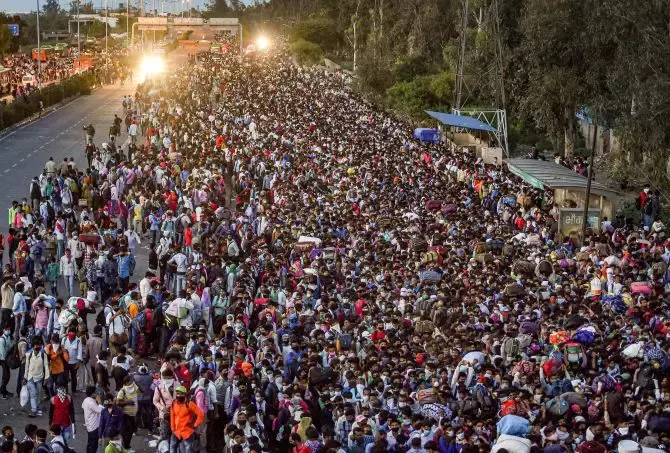Number of Hunger Deaths Most Concerning: Supreme Court
People who migrate for work continue to suffer from the lockdown

"No citizen should die of hunger" declared the Supreme Court on July 21 as it took a second swing at securing compliance with its judgment on the harm done by the surprise lockdown announced in March 2020 by Narendra Modi.
The court was hearing a petition alleging the states and centre had failed to comply with its orders, violating the fundamental rights of people who migrate for work and those who depend on public food entitlements to live.
A clutch of petitions filed in the lockdown's wake led at first to non-intervention by the court, with a bench of Justices L Rao, S Kaul and B Gavai famously asking of migrant workers, "How can we prevent them from walking?"
The lockdown was violating their fundamental rights - this argument led another bench of the court to take notice of the "issues and miseries of migrant labourers" in May 2020.
It is an issue that has caused an incredible and varied amount of damage to many working people and their families, in terms of employment, housing, food, child labour, declining health and literacy, misery over the past two years.
The court said in its judgment last year that a government cannot neglect its duties to provide food to everyone, especially during a pandemic, simply because they do not have a ration card. It attributed the failure to supply ration cards to their "poverty and lack of education. The State cannot abdicate its duty towards such persons, especially in the wake of the pandemic where large numbers of migrant workers are not able to get jobs which may satisfy their basic needs."
It had directed the union to "reassess" how many people qualify for the Public Distribution System, because the existing list was dated and there had been a lot of movement of people during the pandemic and after.
State governments were to provide rations to all those qualifying, whether or not they could produce documents to claim their entitlement. They were also to start running community kitchens wherever the number of migrant workers was high or growing.
However, the Supreme Court said, it was forced to take up the matter again as these directions had not been implemented to their fullest functional extent in the year gone by. Justice Nagarathna said that the number of deaths due to hunger was "most concerning."
"Ultimately in India no citizen should die of hunger. But that is happening. Citizens are dying of hunger. In villages they tie their stomach tightly with cloth; they drink water and sleep. They tie it tightly so that they can kill hunger," he said.
The case against the Union was argued by advocates Prashant Bhushan and Cheryl D'Souza.
They pointed out that according to the Centre's e-shram portal (the instituting of which was directed by the Supreme Court last June) there are 27.95 crore registered workers in the informalised sector. State governments are required to identify which of these persons qualify for the benefits of a ration card under the NFSA - considering over 75% of migrant workers do not possess one.
They said only a few states had provided details of implementation of schemes where dry rations are to be distributed to migrant labourers. According to an RTI reply from September 2021, many states that requested additional rations under the Union government's direction did not in fact receive them in time.
As of September last year, they said, the central government had not provided any states with the additional requirement of food grains, as directed by the Supreme Court, although Telangana and Meghalaya had requested foodgrains for the distribution of dry rations.
The centre cut public wheat procurement by 44% this year.
Hearing the appeal, the Supreme Court said that it would pass orders in the near future detailing steps to be taken to fully execute the directions it issued last year.
Cover photo PTI



